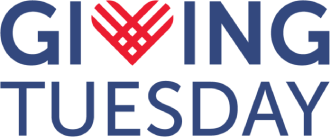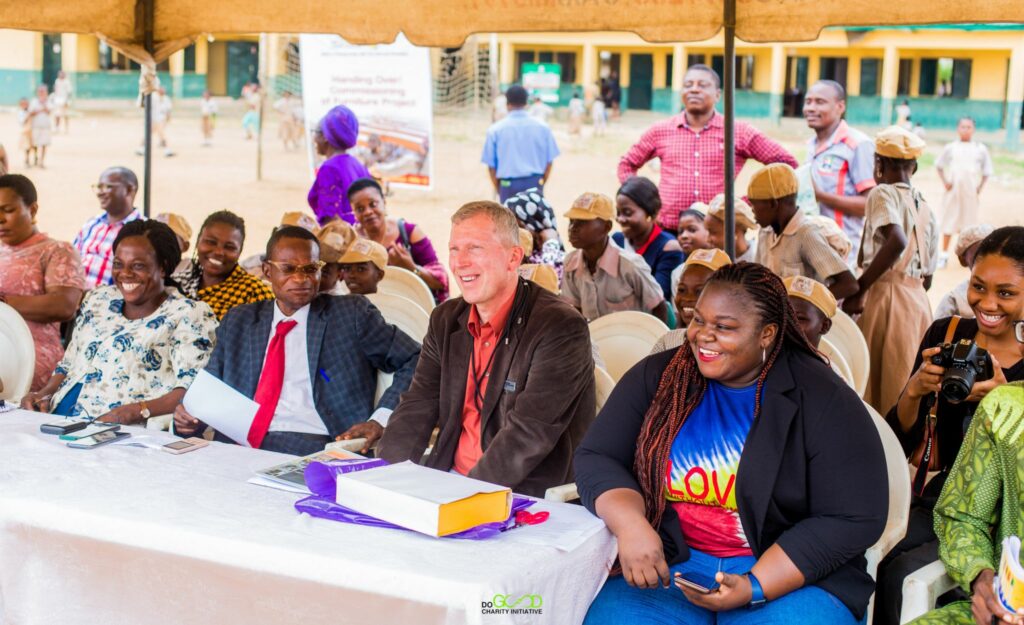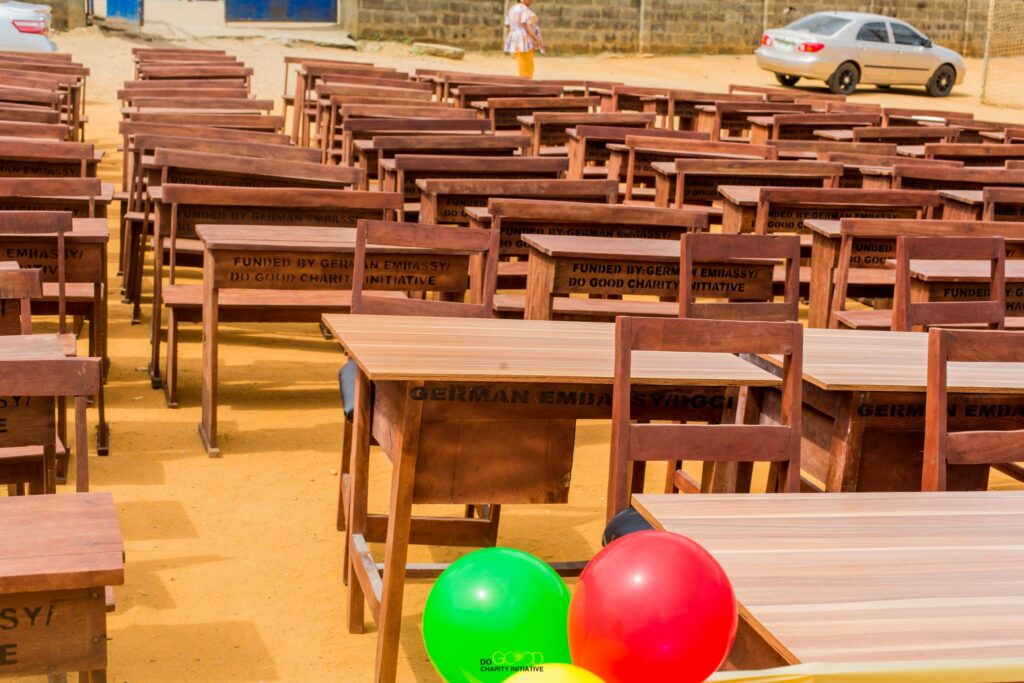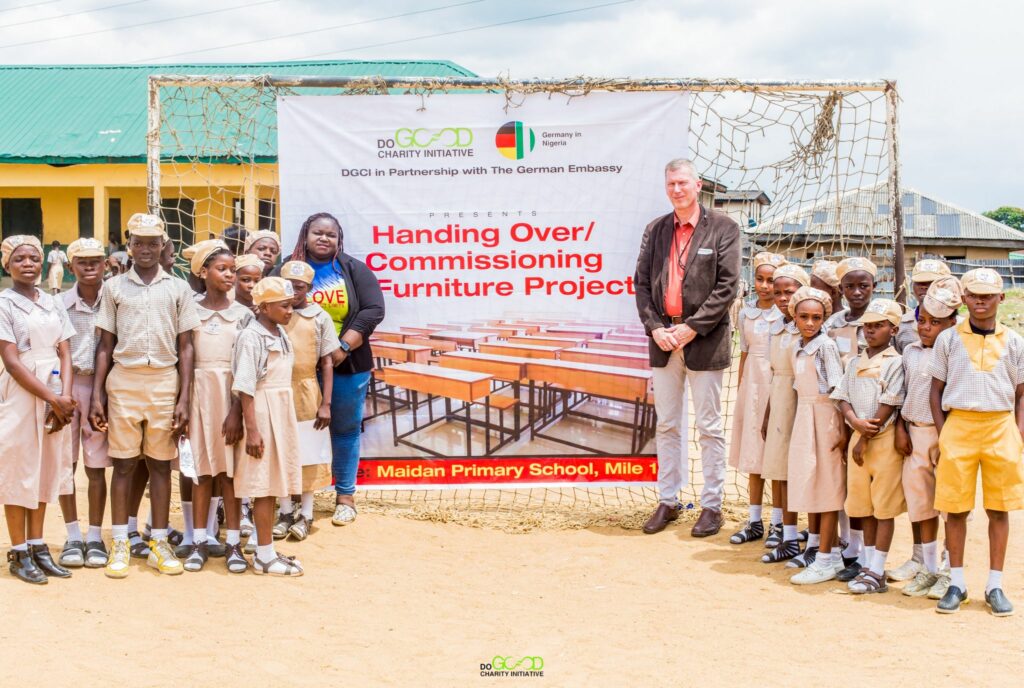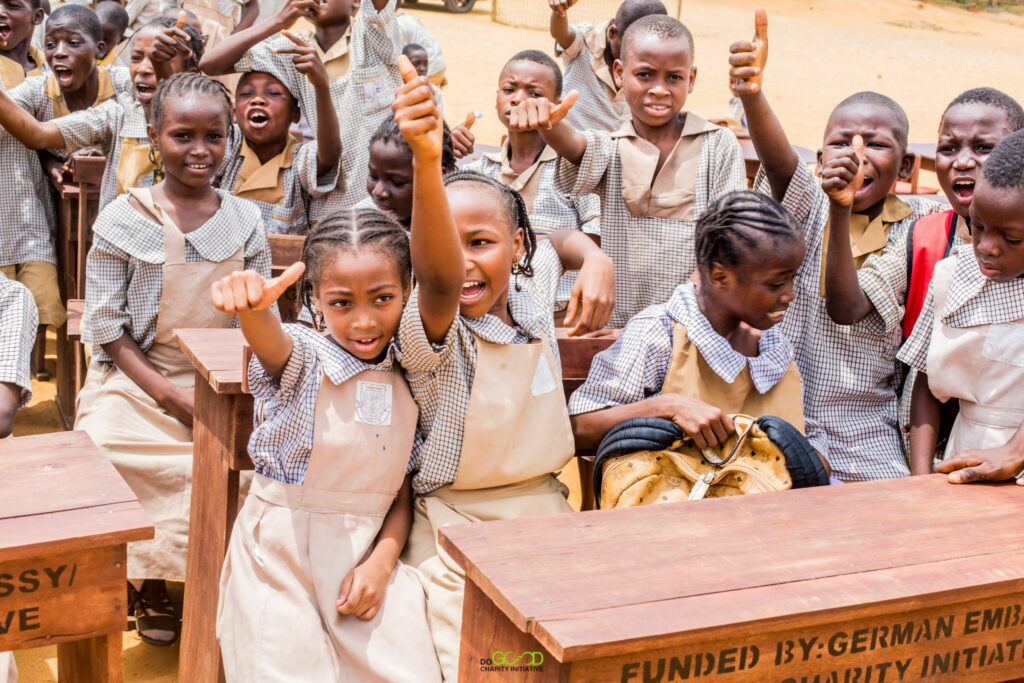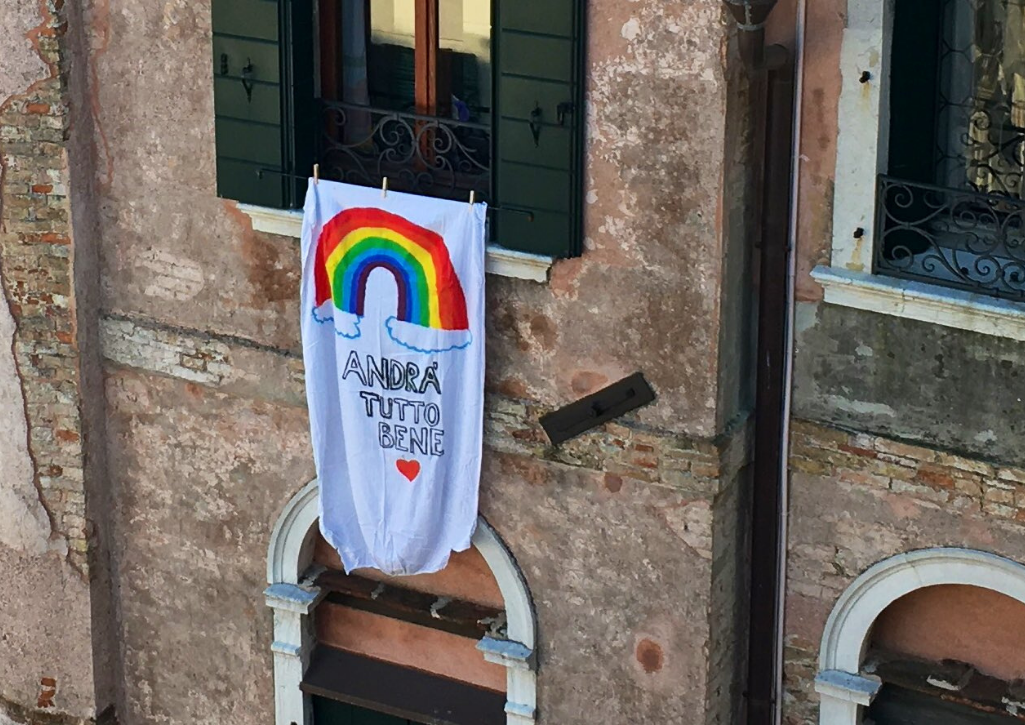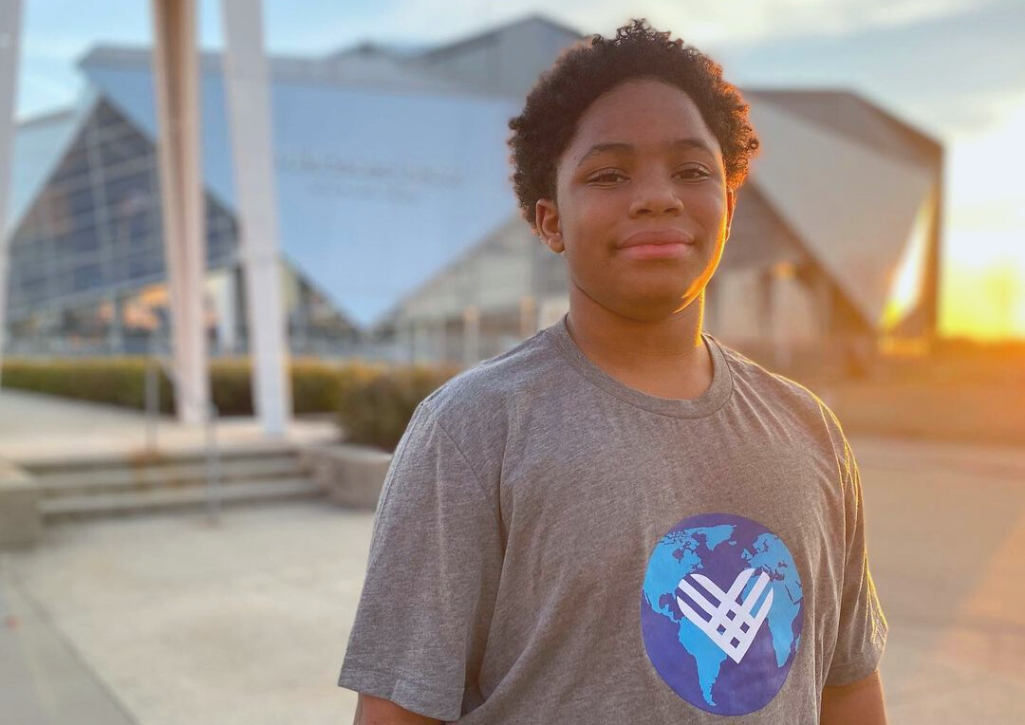In Nigeria, GivingTuesday participants are leading community-driven solutions that improve learning conditions and expand opportunity through acts of generosity. Under the leadership of Folakemi Adesina, Executive Director of Do Good Charity Initiative and Country Lead for GivingTuesday Nigeria, the movement has mobilized schools, nonprofits, and volunteers across the country to tackle challenges with creativity and compassion.
One recent project shows how generosity, paired with the right partnerships, can drive impactful change. By collaborating with the German Consulate in Lagos, Folakemi and her team demonstrated what’s possible when local needs meet global solidarity. We talk to her to learn how this project came to life, what lessons emerged from partnering with a foreign government, and how her team continues to grow a culture of everyday generosity in Nigeria.
Q&A with Folakemi Adesina – Executive Director at Do Good Charity Initiative and GivingTuesday Nigeria Country Lead
Q: Share a little bit about yourself and your organization.
A: I’m a lawyer and nonprofit leader passionate about equity, inclusion, and social protection for children, women, and underserved communities. I’m the Founder and Executive Director of Do Good Charity Initiative, a Nigerian nonprofit that works to improve access to education, health, and dignity for vulnerable populations through community-led projects.
GivingTuesday Nigeria was officially launched in 2020 and, under the umbrella of Do Good Charity Initiative, became the lead organization in 2022. I serve as the Country Lead. Our mission is to promote a culture of generosity by encouraging individuals, schools, businesses, and nonprofits to give back in any way they can—whether through time, skills, resources, or voice.
We measure impact by the number of organizations and communities engaged, the reach of our campaigns, and tangible outcomes such as meals served, hygiene supplies distributed, and school infrastructure improved. For example, over 120 organizations across 12 states actively participated in GivingTuesday Nigeria last year alone.
Q: When did you first hear about GivingTuesday, and what inspired you to bring it to your community in Nigeria? Why did you want to become a country leader?
A: I first heard about GivingTuesday in 2020, during the height of the COVID-19 pandemic, when communities were facing significant hardship. I was drawn to the simplicity and power of the message: everyone has something to give. At the time, we had created an upcycling project where we collected used denim to make school bags for marginalized children. It was during this project that I came across GivingTuesday, and we decided to leverage the movement to rally support. By the end, we had received enough donations to produce school bags, lunch bags, and tote bags for children in need.
When I first joined GivingTuesday Nigeria, I served as a Community Leader. Over time, because of my dedication to the movement, the leadership baton was passed to me, and I became the Country Lead. I wanted to bring GivingTuesday to more communities in Nigeria because I saw how much generosity already existed here, especially at the grassroots level, but it wasn’t always recognized or coordinated. Becoming a country leader allowed me to give structure to that generosity, help it grow, and create a platform for local nonprofits and change agents to amplify their impact.
Q: Tell us more about the classroom furniture project. Where did the idea originate, and what steps did you take to bring it to life?
A: The idea came during one of our school visits in Lagos, where we noticed that many pupils were learning while sitting on the floor or sharing broken benches. It was a dignity issue, but also a learning barrier. We knew something had to be done.
We assessed the schools in need, gathered data on the number of pupils affected, and developed a proposal to tackle the challenge. The project aimed to provide durable, child-friendly furniture that would improve the learning environment and restore a sense of dignity to students and teachers.
Q: In 2023, you partnered with the German Consulate to deliver this initiative. How did that partnership come together, and what did it enable you to accomplish?
A: We reached out to the German Consulate in Lagos through their small grants program, highlighting our track record in school development and the urgent need for furniture in Maidan Primary School. They reviewed our proposal and agreed to support the project.
Through their funding, we were able to provide 120 sets of desks and chairs benefiting both students and teachers. This not only improved classroom conditions but also boosted attendance and teacher morale.
Q: How did you engage your community, partners, or volunteers before and during the campaign? What role did GivingTuesday play in amplifying the effort?
A: Before the campaign, we conducted needs assessments, engaged school leadership, and mobilized local artisans to produce the furniture. During the project, we kept our partners updated with visuals and progress reports.
GivingTuesday played a big role in amplifying our message after the handing over of the project. We used the platform to highlight the issue of neglected school infrastructure and celebrate the power of collective giving. Sharing stories from the project on GivingTuesday helped us attract more attention, new collaborators, and volunteers eager to contribute to the change.
Q: What tools, strategies, or approaches helped make the campaign successful? Would you recommend anything to others hoping to build similar government partnerships?
A: Clear communication, data-driven advocacy, and community involvement were key to the campaign’s success. We presented the challenge with real numbers and stories, and ensured transparency at every stage, which built trust with both donors and beneficiaries.
For anyone hoping to build partnerships with government or diplomatic bodies, I’d recommend starting with a clear, community-anchored problem, demonstrating past impact, and showing how your proposed solution aligns with their mission or interests. Local credibility matters, so involve the community and stakeholders meaningfully and document everything.
Q: Looking back, what worked especially well—and what might you approach differently next time?
A: One of the most effective aspects was grounding the project in real community needs. We listened first, then acted. Involving local artisans in furniture production also helped us support livelihoods while solving a pressing problem.
What I might do differently next time is allocate more time for follow-up engagement with students and teachers after delivery. We learned that post-project feedback is just as important as planning—it helps track long-term impact and identify areas for improvement.
Q: Did you face any unexpected challenges during the project? How did you address them?
A: Yes. We faced a delay in the production timeline due to the rainy season, which affected logistics and delivery. Some of the artisans also had trouble sourcing quality materials on time due to inflation.
We addressed these challenges by maintaining open communication with all parties, adjusting our timelines, and supporting artisans through bulk purchasing to reduce costs. Flexibility and consistent follow-up helped us stay on course.
Q: What was your most memorable or meaningful moment from this initiative?
A: The most meaningful moment was the look on the children’s faces when they walked into their newly furnished classrooms. For many of them, it was the first time they had a seat of their own. One child said, “Now I don’t have to fight to sit anymore.”
That simple statement reminded me why we do this work. Dignity isn’t always tied to big things, it’s about small, everyday things, like having a place to sit and learn.
Q: How are you continuing to build on this momentum after the campaign? What’s next for the Do Good Charity Initiative?
A: We’re currently expanding our “Safe Schools” focus beyond furniture to include sanitation, hygiene education, and basic infrastructure. We’ve also launched Nigeria’s first physical Hygiene Bank to address health and dignity gaps among school-age children.
The momentum from the furniture project is helping us strengthen partnerships with local education authorities and explore long-term support for schools in underserved communities. Monitoring and evaluation is also a top priority, so we can continue improving and scaling what works.
Q: We know it’s a little early, but what can we look forward to for GivingTuesday 2025?
A: For GivingTuesday 2025, we’re planning a Giving Festival and a national call to action around “Generosity in Every School” through our Generosity Corner initiative. Our goal is to work with partners across sectors to support at least 25 public schools with essential items like books, uniforms, learning aids, and hygiene kits.
The Giving Festival will bring together organizations and companies engaged in CSR into one shared space where we can celebrate generosity, highlight impact stories, and connect different sectors working toward a common good.
We’re also investing in grassroots storytelling, training young people and teachers to document and share acts of giving within their schools and communities. The goal is to make generosity more visible and relatable, and to inspire others to take part in whatever way they can.
Key Takeaways
- Partnerships drive results: Collaboration with the German Consulate provided 120 desks and chairs to students in need.
- Community and local engagement: Volunteers, school leaders, and artisans were central to the project’s success.
- GivingTuesday amplifies impact: Sharing the story through the platform attracted new supporters and volunteers.
- Small actions matter: Even a simple desk and chair for every child boosted dignity, learning, and morale.

